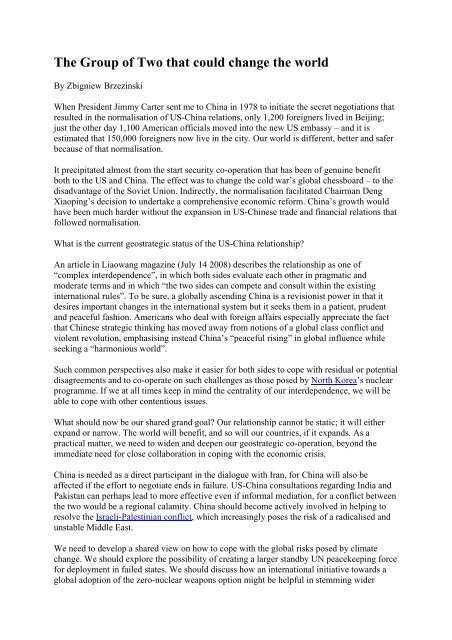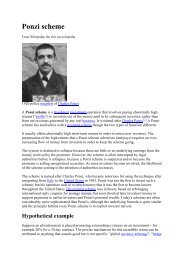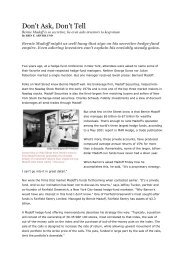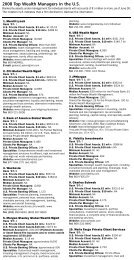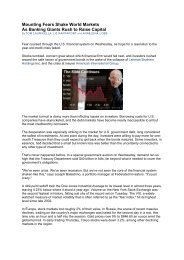The Group of Two that could change the world - Morningbull
The Group of Two that could change the world - Morningbull
The Group of Two that could change the world - Morningbull
Create successful ePaper yourself
Turn your PDF publications into a flip-book with our unique Google optimized e-Paper software.
<strong>The</strong> <strong>Group</strong> <strong>of</strong> <strong>Two</strong> <strong>that</strong> <strong>could</strong> <strong>change</strong> <strong>the</strong> <strong>world</strong><br />
By Zbigniew Brzezinski<br />
When President Jimmy Carter sent me to China in 1978 to initiate <strong>the</strong> secret negotiations <strong>that</strong><br />
resulted in <strong>the</strong> normalisation <strong>of</strong> US-China relations, only 1,200 foreigners lived in Beijing;<br />
just <strong>the</strong> o<strong>the</strong>r day 1,100 American <strong>of</strong>ficials moved into <strong>the</strong> new US embassy – and it is<br />
estimated <strong>that</strong> 150,000 foreigners now live in <strong>the</strong> city. Our <strong>world</strong> is different, better and safer<br />
because <strong>of</strong> <strong>that</strong> normalisation.<br />
It precipitated almost from <strong>the</strong> start security co-operation <strong>that</strong> has been <strong>of</strong> genuine benefit<br />
both to <strong>the</strong> US and China. <strong>The</strong> effect was to <strong>change</strong> <strong>the</strong> cold war’s global chessboard – to <strong>the</strong><br />
disadvantage <strong>of</strong> <strong>the</strong> Soviet Union. Indirectly, <strong>the</strong> normalisation facilitated Chairman Deng<br />
Xiaoping’s decision to undertake a comprehensive economic reform. China’s growth would<br />
have been much harder without <strong>the</strong> expansion in US-Chinese trade and financial relations <strong>that</strong><br />
followed normalisation.<br />
What is <strong>the</strong> current geostrategic status <strong>of</strong> <strong>the</strong> US-China relationship?<br />
An article in Liaowang magazine (July 14 2008) describes <strong>the</strong> relationship as one <strong>of</strong><br />
“complex interdependence”, in which both sides evaluate each o<strong>the</strong>r in pragmatic and<br />
moderate terms and in which “<strong>the</strong> two sides can compete and consult within <strong>the</strong> existing<br />
international rules”. To be sure, a globally ascending China is a revisionist power in <strong>that</strong> it<br />
desires important <strong>change</strong>s in <strong>the</strong> international system but it seeks <strong>the</strong>m in a patient, prudent<br />
and peaceful fashion. Americans who deal with foreign affairs especially appreciate <strong>the</strong> fact<br />
<strong>that</strong> Chinese strategic thinking has moved away from notions <strong>of</strong> a global class conflict and<br />
violent revolution, emphasising instead China’s “peaceful rising” in global influence while<br />
seeking a “harmonious <strong>world</strong>”.<br />
Such common perspectives also make it easier for both sides to cope with residual or potential<br />
disagreements and to co-operate on such challenges as those posed by North Korea’s nuclear<br />
programme. If we at all times keep in mind <strong>the</strong> centrality <strong>of</strong> our interdependence, we will be<br />
able to cope with o<strong>the</strong>r contentious issues.<br />
What should now be our shared grand goal? Our relationship cannot be static; it will ei<strong>the</strong>r<br />
expand or narrow. <strong>The</strong> <strong>world</strong> will benefit, and so will our countries, if it expands. As a<br />
practical matter, we need to widen and deepen our geostrategic co-operation, beyond <strong>the</strong><br />
immediate need for close collaboration in coping with <strong>the</strong> economic crisis.<br />
China is needed as a direct participant in <strong>the</strong> dialogue with Iran, for China will also be<br />
affected if <strong>the</strong> effort to negotiate ends in failure. US-China consultations regarding India and<br />
Pakistan can perhaps lead to more effective even if informal mediation, for a conflict between<br />
<strong>the</strong> two would be a regional calamity. China should become actively involved in helping to<br />
resolve <strong>the</strong> Israeli-Palestinian conflict, which increasingly poses <strong>the</strong> risk <strong>of</strong> a radicalised and<br />
unstable Middle East.<br />
We need to develop a shared view on how to cope with <strong>the</strong> global risks posed by climate<br />
<strong>change</strong>. We should explore <strong>the</strong> possibility <strong>of</strong> creating a larger standby UN peacekeeping force<br />
for deployment in failed states. We should discuss how an international initiative towards a<br />
global adoption <strong>of</strong> <strong>the</strong> zero-nuclear weapons option might be helpful in stemming wider
nuclear weapons proliferation. We certainly need to collaborate closely in expanding <strong>the</strong><br />
current <strong>Group</strong> <strong>of</strong> Eight leading industrial nations to a G14 or G16, in order to widen <strong>the</strong><br />
global circle <strong>of</strong> decision-makers and to develop a more inclusive response to <strong>the</strong> economic<br />
crisis.<br />
But to promote all <strong>that</strong> we need an informal G2. <strong>The</strong> relationship between <strong>the</strong> US and China<br />
has to be a comprehensive partnership, paralleling our relations with Europe and Japan. Our<br />
top leaders should <strong>the</strong>refore meet informally on a regular schedule for personal in-depth<br />
discussions not just about our bilateral relations but about <strong>the</strong> <strong>world</strong> in general.<br />
All this points in a politically as well as philosophically ambitious direction. <strong>The</strong> Chinese<br />
emphasis on “harmony” can serve as a useful point <strong>of</strong> departure for <strong>the</strong> US-Chinese summits.<br />
In an era in which <strong>the</strong> risks <strong>of</strong> a massively destructive “clash <strong>of</strong> civilisations” are rising, <strong>the</strong><br />
deliberate promotion <strong>of</strong> a genuine conciliation <strong>of</strong> civilisations is urgently needed. It is a task<br />
<strong>that</strong> President-elect Barack Obama – who is a conciliator at heart – should find congenial, and<br />
which President Hu Jintao – who devised <strong>the</strong> concept <strong>of</strong> “a harmonious <strong>world</strong>” – should<br />
welcome. It is a mission worthy <strong>of</strong> <strong>the</strong> two countries with <strong>the</strong> most extraordinary potential for<br />
shaping our collective future.<br />
<strong>The</strong> writer was President Carter’s national security adviser. This article is based on a speech<br />
in Beijing this week


